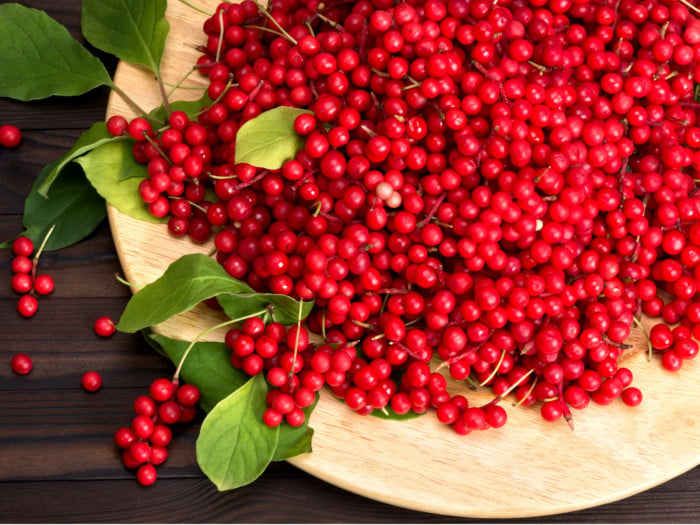Schisandra is a powerful herbal remedy in Chinese traditional medicine that can help strengthen your immune system and liver.
What is Schisandra?
Schisandra is actually a type of woody vine, scientifically known as Schisandra chinensis, that produces small red berries that are widely used in traditional medicine. These berries are often referred to as magnolia berries or five-flavor berries. Native to China and areas of Russia, the berries are said to possess all five basic flavors – salty, sweet, spicy, sour, and bitter – hence the name five-flavor berry. [1]
These berries, in both their dried and fresh form, are used to produce various topical salves, tinctures, extracts, teas, and powders and are actually considered an herb more often than a fruit.
The berries of the schisandra vine contain various lignans and antioxidants, which can provide various health benefits, as well as adaptogens, powerful substances that can ostensibly retrain your body to more effectively manage stress and health. [2]

The five-flavored delicious Schisandra berries. Photo Credit: Shutterstock
Schisandra Benefits
There are many benefits of schisandra that include the following:
- Boosting mental performance
- Preventing premature aging
- Reducing inflammation
- Improving endurance
- Protecting vision
- Giving relief from stress, anxiety.
- Preventing hepatitis infections and treat hepatitis C
- Boosting exercise performance and endurance
- Preventing the worsening of nearsightedness [3]
- Preventing and treating motion sickness
- Regulating blood sugar levels
- Improving liver function and detoxify the body more efficiently
- Acting as a mild sedative and helping in treating the fever
- Boosting energy [4]
- Increasing libido
- Improving digestion
- Weight loss
- Reducing signs of chronic fatigue syndrome
- Enabling normal sleep patterns
- Skin care
Schisandra can support healthy weight loss thanks to its metabolism-boosting properties. It protects skin against chronic conditions and inflammation, such as psoriasis and eczema. Schisandra is known to optimize digestive health and helps relieve symptoms of constipation. It is known as a natural aphrodisiac and aids in increasing sexual function and sperm counts. It has positive effects on mental performance as well and helps in improving concentration, memory, and sharpness. Being anti-inflammatory in nature schisandra relieves the pain associated with arthritis and gout. [5]
Schisandra Dosage
While tradition recommendations on dosage vary, they remain the most reliable source for clear dosages for this medicinal berry.
- If you are eating the dried fruit, do not exceed more than 3 grams per day, and eat the powdered fruit with meals once per day.
- If you are using the dried fruit extract in liquid form, you should use a 1:20 weight/volume ratio of these drops with water, basically mixing 10 drops with 150ml of water and drinking this twice daily.
Since there are very few formal studies on dosage, it is best that you consult with a doctor or trained herbalist before using this medicinal herb. [6]
Schisandra Side Effects
There are some side effects of eating this fruit and its extracts, particularly in high concentrations, such as the following:
- Higher risk of epileptic episodes
- Increase in gastroesophageal syndrome symptoms
- Risk of developing peptic ulcers
The powerful compounds of this berry can also increase the intracranial pressure, which can be dangerous over long periods of time. Using only the recommended and appropriate dosage is strongly recommended. Furthermore, women who are breastfeeding or pregnant should avoid the use of this herb, as the adaptogenic compounds and volatile acids could be too stimulating for the child.
